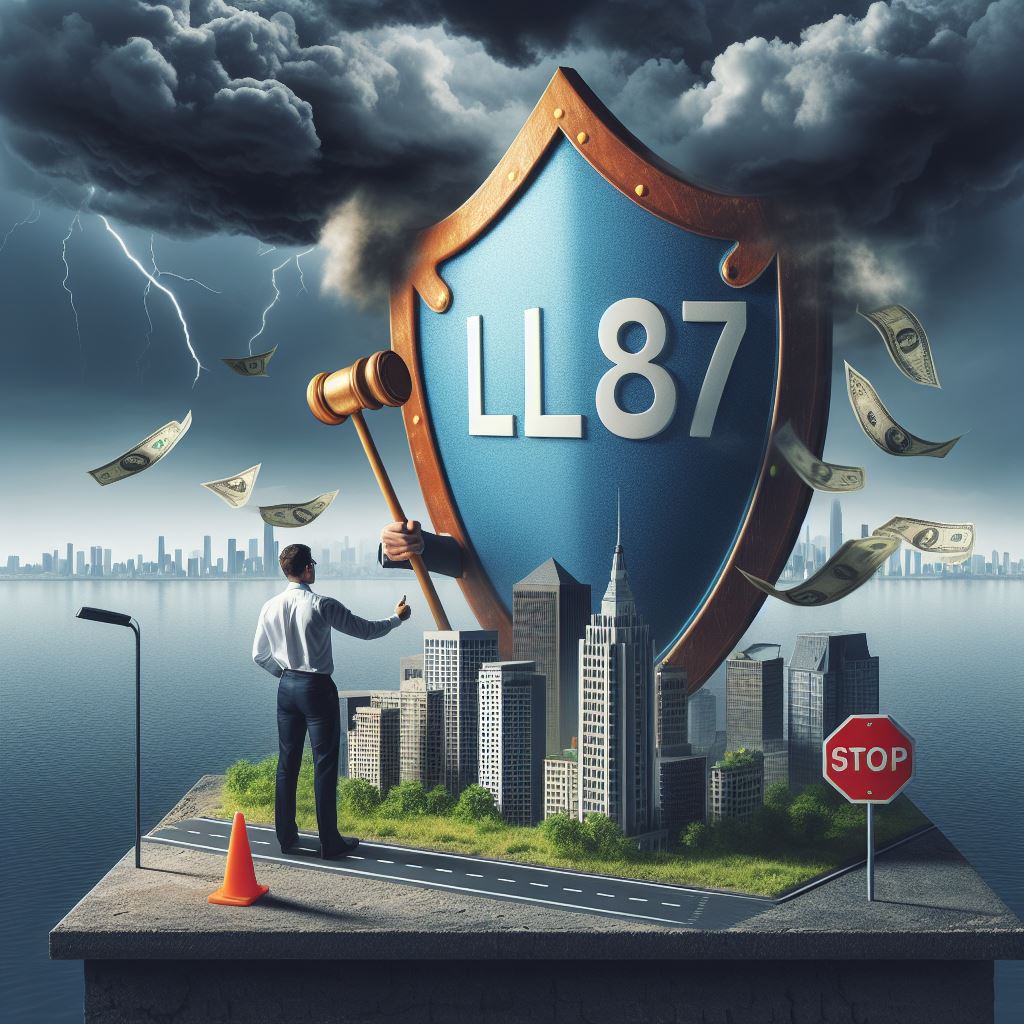I. Introduction
In the heart of New York City, where the skyline is a testament to innovation and architectural prowess, building owners are on the front lines of an equally impressive environmental revolution. Local Law 87 (LL87), a critical piece of legislation, has significant implications for those at the helm of the city’s larger buildings. This law is not merely a regulatory hurdle; it signifies an essential stride towards energy efficiency and environmental responsibility. Neglecting the requirements of LL87 can lead to substantial financial penalties and have long-lasting effects on a property’s reputation and fiscal health. As a building owner, understanding and adhering to LL87 is not optional—it’s a strategic imperative to protect your investment and position your property at the vanguard of New York’s sustainable future.
II. Understanding Local Law 87
Local Law 87 is a keystone of New York City’s broader vision to reduce overall carbon emissions, outlined in the ambitious Greener, Greater Buildings Plan (GGBP). This law requires that buildings with more than 50,000 square feet undergo periodic energy audits and retro-commissioning, ensuring that large real estate assets operate as efficiently as possible.
1. Who Is Affected?
The law’s scope encompasses a diverse array of properties, including commercial and residential high-rises, educational institutions, hospitals, and hotels. Essentially, if a building falls within the specified size parameters, it must comply with LL87.
2. Energy Efficiency Reports (EER) and Deadlines
To comply, owners must submit an Energy Efficiency Report (EER) to the city every ten years. The submission schedule is determined by the last digit of the building’s tax block number—creating a system where each year, a new subset of buildings must submit their EERs. The intricacies of this process mean that vigilant attention to deadlines is paramount for maintaining compliance.
III. Common Reasons for LL87 Violations
Why do some building owners fall afoul of LL87’s requirements? Often, it’s a matter of misunderstanding the complexities of the law. Inadequate energy audits, incomplete retro-commissioning, and missed deadlines are frequent culprits. Misinterpretations about the mandatory nature of specific measures can lead to partial compliance, which in the eyes of the law, is as good as non-compliance.
Another pitfall is the underestimation of the resources required to comply with LL87. This is not a regulation that can be satisfied with minimal effort or investment; it demands thoroughness and professionalism to ensure all aspects of the law are met.
IV. Consequences of LL87 Violations
The repercussions of ignoring LL87 or failing to comply fully can be severe. Fines start at $3,000 for the first year and increase by $5,000 for each subsequent year that a building remains non-compliant. Over time, these fines can accumulate to a significant financial burden that could have been avoided with proper planning and execution.
Beyond financial penalties, there is a reputational risk. Buildings that fail to comply with LL87 might be seen as outdated and not keeping pace with the city’s environmental standards. This perception can affect tenant acquisition and retention and the overall appeal of the property in a competitive real estate market.
V. Steps to Ensure LL87 Compliance
Ensuring compliance with LL87 requires a proactive approach. Building owners should consider the following steps:
1. Engage Qualified Professionals
Hiring experienced energy auditors and retro-commissioning agents is the first step toward ensuring your building meets LL87 requirements. These professionals can accurately assess your property’s current energy efficiency status and guide you through the necessary improvements.
2. Keep a Compliance Calendar
Track and mark important deadlines for EER submission in your calendar. Staying organized is crucial to avoid missing submission dates, which could lead to violations and fines.
3. Accurate Reporting
Ensure all energy efficiency measures and retro-commissioning tasks are thoroughly documented and reported. Inaccurate or incomplete reporting can result in compliance issues.
4. Stay Informed
LL87 requirements can evolve, so it’s essential to stay informed about any changes to the law. The [NYC Department of Buildings](https://www1.nyc.gov/site/buildings/index.page) is a valuable resource for the latest updates and compliance guidelines.
VI. Benefits of LL87 Compliance
Remaining in good standing with LL87 isn’t just about avoiding penalties—it has tangible benefits that can enhance the profitability and value of your property. Energy-efficient buildings often have lower operating costs, which can translate to increased net income and property value. In addition, buildings that meet or exceed energy efficiency standards can attract eco-conscious tenants, allowing for potentially higher rental rates and increased occupancy.
Furthermore, compliance with LL87 contributes to a larger societal benefit by making New York City a leader in urban sustainability. As more buildings improve their energy efficiency, the collective impact on the city’s carbon footprint is significant, reflecting well on the community-mindedness of building owners.
VII. Expanding Your Bottom Line Through LL87 Compliance

Meeting the energy efficiency standards set by LL87 is not merely about compliance—it’s about seizing an opportunity to enhance your property’s marketability and operational efficiency. Consider the following:
1. Increased Asset Value
Buildings that are compliant with energy regulations are often more attractive in the real estate market. Energy-efficient properties may command higher sale prices, providing a solid return on investment for any energy efficiency projects undertaken.
2. Reduced Risk Profile
Insurance companies may view compliant buildings as lower risk, which can result in more favorable insurance premiums. This reduction in operating expenses can have a positive impact on your bottom line.
3. Incentives and Rebates
The pursuit of LL87 compliance can open the door to various energy incentives and rebates offered by both state and local energy programs. Taking advantage of these financial incentives can help offset the costs associated with energy efficiency projects.
VIII. Conclusion
Local Law 87 is a call to action—a mandate that building owners must embrace to ensure both regulatory compliance and the continued viability of their property in an ever-greening New York City. The risks of non-compliance are significant and should serve as motivation for immediate action. By attending to LL87’s requirements now, you can protect your bottom line, enhance your building’s value, contribute to the city’s environmental goals, and forge a reputation as a proactive and responsible property owner.
The path to compliance is clear: understand the law, engage the right professionals, stay organized, and reap the benefits of running an energy-efficient building. The future is energy-conscious, and by aligning with Local Law 87 today, you invest not only in your property but in a sustainable and prosperous tomorrow for New York City.
VertPro.com serves as a resourceful platform for property owners and managers seeking to enhance their buildings’ energy efficiency. The site offers a range of services, including Commercial Energy Audits, Benchmark Compliance consultancy, and a Construction Marketplace. At the heart of VertPro® is a suite of SaaS technology-based solutions designed to assist in navigating the complexities of Energy Benchmarking and Energy Audits/RCx Plus, while ensuring adherence to over 60 Energy Benchmarking and Energy Efficiency Laws across the country.
For those looking to improve their property’s energy usage and operational value, VertPro.com provides a diverse array of tools and information. The site aims to facilitate a better understanding of energy efficiency practices and legislation, helping building owners and property managers make informed decisions about their energy strategies while complying with all energy ordinances and laws.


